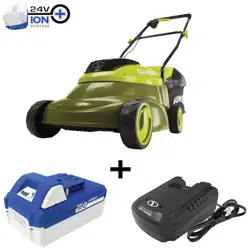Loading ...

2
14. Keep cutting blades sharp and clean –
Properly maintained cutting blades with sharp edges are
less likely to bind and are easier to control.
15. Keep all parts of the body away from the cutting blade
– Do not remove cut material or hold material to be cut
when blades are moving. Make sure the switch is o when
clearing jammed material. A moment of inattention while
operating the product may result in serious personal injury.
16. If the lawn mower strikes a foreign object, follow these
steps:
i) Stop the lawn mower by releasing the start/stop switch
bar lever.
ii) Remove the safety key.
iii) Inspect for damage.
iv) Repair any damage before restarting and operating
the lawn mower.
17. Only use identical replacement blades and
other genuine parts.
18. Keep guards in place and in proper working order.
Electrical Safety
1. If the battery charger cable is damaged, please call the
Snow Joe
®
+ Sun Joe
®
customer service center at
1-866-SNOWJOE (1-866-766-9563).
2. If charging the power tool in a damp location is
unavoidable, use a residual current device (RCD)
protected power supply. The using of an RCD reduces the
risk of electric shock.
3. Avoid body contact with earthed or grounded surfaces
such as pipes, radiators, ranges and refrigerators. There is
an increased risk of electric shock if your body is earthed
or grounded.
4. Do not expose power tools to rain or wet conditions.
Water entering a power tool will increase the risk of
electric shock.
5. Do not abuse the charging cord. Never use the cord for
carrying, pulling or unplugging the charger.
Keep cord away from heat, oil, sharp edges or moving
parts. Damaged or entangled cords increase the risk of
electric shock.
6. Battery charger is for indoor use only. Do not charge lawn
mower in rain, or in wet locations.
Battery & Charger
Safety Instructions
We pay a great deal of attention to the design of every battery
pack to ensure that we supply you with batteries that are safe,
durable and have a high energy density. The battery cells have
a wide range of safety devices. Each individual cell is initially
formatted and its electrical characteristic curves are recorded.
This data is then used exclusively to be able to assemble the
best possible battery packs.
Despite all the safety precautions, caution must always be
exercised when handling batteries. The following points must
be obeyed at all times to ensure safe use. Safe use can only
be guaranteed if undamaged cells are used. Incorrect handling
of the battery pack can cause cell damage.
IMPORTANT! Analyses conrm that incorrect use and poor
care of high-performance batteries are the main factors
responsible for personal and/or product damage.
mWARNING! Use only approved replacement batteries;
other batteries may damage the power tool and cause it to
malfunction, which can lead to serious personal injury.
mWARNING! Do not use a battery pack or appliance that
is damaged or modied. Damaged or modied batteries may
exhibit unpredictable behavior resulting in re, explosion or risk
of injury.
Do not modify or attempt to repair the appliance or the battery
pack except as indicated in the instructions for use and care.
Have your battery pack serviced by a qualied repair person
using only identical replacement parts. This will ensure that the
safety of the battery pack is maintained.
mCAUTION! To reduce the risk of injury, charge the
24V iON+ lithium-iON battery pack only in its designated
24V iON+ lithium-iON charger. Other types of chargers present
risk of re, personal injury and damage. Do not wire a battery
pack to a power supply plug or car cigarette lighter. Such
misuse will permanently disable or damage the battery pack.
• Avoid dangerous environments – Do not charge the
battery pack in rain, snow or in damp or wet locations.
Do not use the battery pack or charger in the presence of
explosive atmospheres (gaseous fumes, dust or ammable
materials) because sparks may be generated when inserting
or removing the battery pack, which could lead to a re.
• Charge in a well-ventilated area – Do not block the
charger vents. Keep them clear to allow for proper
ventilation. Do not allow smoking or open ames near a
charging battery pack. Vented gases may explode.
NOTE: The safe temperature range for the battery is 41°F
(5°C) to 105°F (40.5°C). Do not charge the battery outside in
freezing weather; charge it at room temperature.
• Maintain charger cord – When unplugging the charger,
pull the plug, not the cord, from the receptacle to reduce
the risk of damage to the electrical plug and cord.
Never carry the charger by its cord or yank it by the cord
to disconnect it from the receptacle. Keep the cord away
from heat, oil and sharp edges. Make sure the cord will not
be stepped on, tripped over or subjected to damage or
stress when the charger is in use. Do not use the charger
with a damaged cord or plug. Replace a damaged charger
immediately.
• Do not use an extension cord unless it is absolutely
necessary – Using the wrong, damaged or improperly
wired extension cord poses a risk of re and electric shock.
If an extension cord must be used, plug the charger into a
properly wired 16 gauge or larger extension cord with the
female plug matching the male plug on the charger. Make
sure that the extension cord is in good electrical condition.
Loading ...
Loading ...
Loading ...
